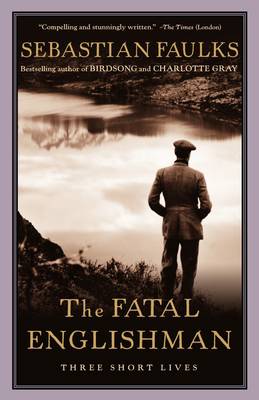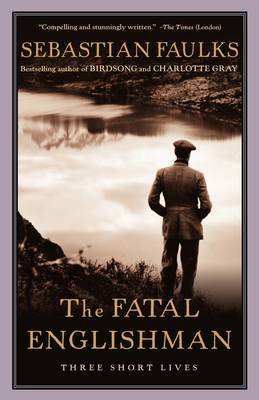
- Afhalen na 1 uur in een winkel met voorraad
- Gratis thuislevering in België vanaf € 30
- Ruim aanbod met 7 miljoen producten
- Afhalen na 1 uur in een winkel met voorraad
- Gratis thuislevering in België vanaf € 30
- Ruim aanbod met 7 miljoen producten
Zoeken
€ 19,45
+ 38 punten
Uitvoering
Omschrijving
In The Fatal Englishman, his first work of nonfiction, Sebastian Faulks explores the lives of three remarkable men. Each had the seeds of greatness; each was a beacon to his generation and left something of value behind; yet each one died tragically young.
Christopher Wood, only twenty-nine when he killed himself, was a painter who lived most of his short life in the beau monde of 1920s Paris, where his charm, good looks, and the dissolute life that followed them sometimes frustrated his ambition and achievement as an artist.
Richard Hillary was a WWII fighter pilot who wrote a classic account of his
experiences, The Last Enemy, but died in a mysterious training accident while defying doctor's orders to stay grounded after horrific burn injuries; he was twenty-three.
Jeremy Wolfenden, hailed by his contemporaries as the brightest Englishman of
his generation, rejected the call of academia to become a hack journalist in Cold War Moscow. A spy, alcoholic, and open homosexual at a time when such activity was still illegal, he died at the age of thirty-one, a victim of his own recklessness and of the peculiar pressures of his time.
Through the lives of these doomed young men, Faulks paints an oblique
portrait of English society as it changed in the twentieth century, from the Victorian era to the modern world.
Christopher Wood, only twenty-nine when he killed himself, was a painter who lived most of his short life in the beau monde of 1920s Paris, where his charm, good looks, and the dissolute life that followed them sometimes frustrated his ambition and achievement as an artist.
Richard Hillary was a WWII fighter pilot who wrote a classic account of his
experiences, The Last Enemy, but died in a mysterious training accident while defying doctor's orders to stay grounded after horrific burn injuries; he was twenty-three.
Jeremy Wolfenden, hailed by his contemporaries as the brightest Englishman of
his generation, rejected the call of academia to become a hack journalist in Cold War Moscow. A spy, alcoholic, and open homosexual at a time when such activity was still illegal, he died at the age of thirty-one, a victim of his own recklessness and of the peculiar pressures of his time.
Through the lives of these doomed young men, Faulks paints an oblique
portrait of English society as it changed in the twentieth century, from the Victorian era to the modern world.
Specificaties
Betrokkenen
- Auteur(s):
- Uitgeverij:
Inhoud
- Aantal bladzijden:
- 336
- Taal:
- Engels
Eigenschappen
- Productcode (EAN):
- 9780375727443
- Verschijningsdatum:
- 12/03/2002
- Uitvoering:
- Paperback
- Formaat:
- Trade paperback (VS)
- Afmetingen:
- 131 mm x 202 mm
- Gewicht:
- 303 g

Alleen bij Standaard Boekhandel
+ 38 punten op je klantenkaart van Standaard Boekhandel
Beoordelingen
We publiceren alleen reviews die voldoen aan de voorwaarden voor reviews. Bekijk onze voorwaarden voor reviews.











